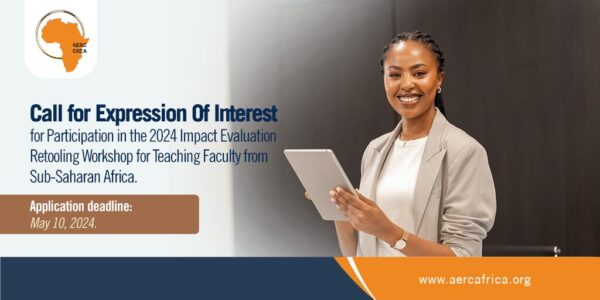
African Economic Research Consortium
The African Economic Research Consortium (AERC), established in 1988, is a public not-for-profit organization devoted to the advancement of policy research and graduate training to inform economic policies in sub-Saharan Africa (SSA). The principal objective is to strengthen local capacity for conducting independent, rigorous inquiry into problems pertinent to the management of Sub-Saharan African economies through a synergetic programme combining economic research with postgraduate training in economics and supported by an interactive communications and policy outreach, within a vast network of researchers, universities and policymakers across Africa and the globe. The AERC is supported by donor governments, private foundations, and international organizations.
The AERC has received financing from the University of North Carolina and the American Institutes for Research (AIR) and intends to apply the funds to conduct an Impact Evaluation Retooling Workshop. Targeted participants will be teaching faculties from the AERC network of the Collaborative Masters in Agricultural and Applied Economics (CMAAE), the Collaborative Masters Programme (CMAP), and the Collaborative PhD Programme (CPP) universities in Sub-Saharan Africa.
The Impact Evaluation Retooling Workshop
Every year, large amounts of resources are spent implementing social and economic policies. In a context of limited resources, it is important for policymakers, programme managers, and civil society to examine whether programmes are having their intended impact. Good evaluations play an important role by providing concrete evidence of the impact of programmes on target populations. Does a programme have an impact? Does the programme have a different impact on different groups of people? Do different programme components have different impacts? Why and how does the programme have an impact? Which programmes are more cost effective in achieving desired outcomes? Those are important questions that can be answered by rigorous evaluations. In this workshop, methods for providing answers to some of those questions will be reviewed. The limitations of the methods and the conditions under which they provide valid answers will also be reviewed.
Objectives
The course will provide intensive training in the concepts of programme evaluation and in the designs and techniques for evaluating programme impact. The main workshop objectives are to:
- Understand the basic concepts of programme and policy impact evaluation.
- Define the impact evaluation questions and to examine the main issues to consider for answering those questions in a valid way, including gender and other group-specific heterogeneity.
- Review the main evaluation designs and estimation methods used for evaluating programme impact.
- To develop criteria for choosing the appropriate estimation strategy given different scenarios of programme characteristics and data availability.
- To interpret results appropriately and to examine the programmatic implications of results.
- To gain practical experience applying the estimation strategies and quantitative tools.
Workshop Content
This hands-on training will cover the following areas:
- Difference between impact evaluation and other types of evaluation.
- Answering the impact evaluation question.
- Evaluation designs and key issues to consider: confounding, selectivity, externalities, contamination, and others.
- Experimental designs, matching and regression-discontinuity.
- Selectivity and endogeneity problems: causes, consequences, and solutions.
- Instrumental variables methods.
Difference-in-differences.
The workshop consists of lectures, Stata practical sessions and case studies. Participants are encouraged to bring their own cases of programmes they are evaluating in their countries for discussion with the trainers.
Training Facilitators
The course is a collaboration between the AERC, the Transfer Project https://transfer.cpc.unc.edu and AIR. It is designed and taught by experts from the University of North Carolina at Chapel Hill, AIR, and UNICEF Innocenti – Global Office of Research and Foresight.
Dates and Structure of the Workshop
A face-to-face approach will be used to conduct the workshop from June 30 – July 6, 2024, as follows:
- June 30, 2024: Arrival of participants to Nairobi, Kenya.
- July 1-6, 2024: Full day face-to-face instruction.
- July 7, 2024: Travel back to home residence.
Eligibility
To qualify for participation in the Impact Evaluation workshop, an applicant must:
- Be a national of a Sub-Saharan African country.
- Hold a PhD degree in Economics, Agricultural Economics, or related field from a recognized institution.
- Be a teaching faculty in any of the AERC network of the CMAAE, CMAP and CPP universities.
- Computer literacy, experience with household survey data, and knowledge of regression analysis is essential. The course will be taught in English with French simultaneous interpretation.
Note: Female applicants are strongly encouraged to apply.
Application Process
Applications should be submitted online using the link: https://training.aercafrica.org/facultyapplications and addressed to:
The Executive Director
African Economic Research Consortium (AERC)
3rd Floor, Middle East Bank Towers, Jakaya Kikwete Road
P.O. Box 62882 – 00200 Nairobi, Kenya
The application should include:
- Application cover letter clearly indicating you are a member of the teaching faculty of an AERC network university.
- Letter from the Head of Department to support your application to participate in the workshop.
- Curriculum Vitae (clearly indicating gender; nationality; academic qualification; postal, email and telephone contacts, including country code).
The application letter should be referenced “Application for Impact Evaluation Faculty Retooling Workshop 2024”. The deadline for submitting applications is Friday, May 10, 2024.
For more information on our programmes, please visit the AERC website on: www.aercafrica.org.




